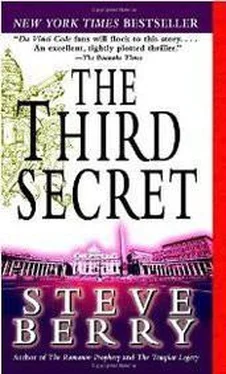“It is the answers to those riddles that interest me.”
“I wish you the best in Kenya. Enjoy the heat.”
He started to walk away.
“You won’t win,” Ngovi said.
He turned back. He didn’t like the smug look on the African’s face, but couldn’t help asking, “Why?”
Ngovi did not answer. He simply brushed past and entered the chapel.
The cardinals took their assigned places. Ngovi stood before the altar, appearing almost insignificant before the chaotic vision of color that was Michelangelo’s Last Judgment.
“Before the voting begins, I have something to say.”
All 113 cardinals turned their heads toward Ngovi. Valendrea sucked a deep breath. He could do nothing. The camerlengo was still in charge.
“Some of you seem to think I am the one to succeed our most beloved and departed Holy Father. Though your confidence is flattering, I must decline. If I am chosen, I will not accept. Know that, and govern your vote accordingly.”
Ngovi stepped from the altar and took his place among the cardinals.
Valendrea realized that none of the forty-three men supporting Ngovi would stay with him now. They wanted to be part of a winning team. Since their horse had just bolted from the track, their allegiances would shift. With little chance for a third candidate to emerge at this late time, Valendrea quickly clicked off the math. He needed only to keep his present fifty-nine cardinals and add a fraction of Ngovi’s headless bloc.
And that could easily be done.
He wanted to ask Ngovi why. The gesture made no sense. Though he denied wanting the papacy, somebody had orchestrated the African’s forty-three votes, and he sure as hell didn’t believe the Holy Spirit had much to do with it. This was a battle between men, organized by men, and executed by men. One or more of the men surrounding him was clearly an enemy, albeit a covert one. A good candidate for the ringleader was the cardinal-archivist, who possessed both the stature and the knowledge. He hoped Ngovi’s strength was not a rejection of him. He would need loyalty and enthusiasm in the years ahead, with dissidents being taught a lesson. That would be Ambrosi’s first task. All must understand that there was a price to pay for choosing wrong. But he had to give the African sitting across from him credit. You won’t win. No. Ngovi was simply handing him the papacy. But who cared.
A win’s a win.
The voting took an hour. After Ngovi’s surprise announcement, everyone appeared anxious to end the conclave.
Valendrea did not write down the tally, he just mentally added up each repeat of his name. When the seventy-sixth time occurred, he quit listening. Only when the scrutineers pronounced his election with 102 votes did he focus on the altar.
He’d many times wondered what this moment would feel like. Now he alone dictated what a billion Catholics would or would not believe. No longer could any cardinal refuse his command. He would be called Holy Father, his every need catered to until the day he died. Cardinals had cried and cowered at this moment. A few had even fled the chapel, screaming their refusal. He realized every eye was about to focus upon him. He was no longer Alberto Cardinal Valendrea, bishop of Florence, secretary of state for the Holy See.
He was pope.
Ngovi approached the altar. Valendrea understood the African was about to perform his final duty as camerlengo. After a moment of prayer, Ngovi walked in silence down the center aisle and stood before him.
“Do you, most reverend Lord Cardinal, accept your election as supreme pontiff, which has been canonically carried out?”
They were words that had been spoken to victors for centuries.
He stared into Ngovi’s piercing eyes and tried to sense what the older man was thinking. Why had he refused to be a candidate, knowing a man he despised would almost certainly be selected pontiff? From everything he knew, this African was a devout Catholic. A man who would do whatever was necessary to protect the Church. He was no coward. Yet he’d walked away from a fight he might have won.
He purged those confusing thoughts from his mind and said in a clear voice, “I accept.” It was the first time in decades that Italian had been used in response to that question.
The cardinals stood and erupted in applause.
The grief for a dead pope was now replaced by the elation for a new pontiff. Outside the chapel doors Valendrea imagined the scene as observers heard the commotion, the first signal that something might have been decided. He watched as one of the scrutineers carried the ballots toward the stove. In a few moments white smoke would fill the morning sky and the piazza would erupt in cheers.
The ovation subsided. One more question was required.
“By what name will you be known?” Ngovi asked in Latin.
The chapel went silent.
The choosing of a name signaled much of what may be coming. John Paul I proclaimed his legacy by selecting the names of his two immediate predecessors, a message that he hoped to emulate the goodness of John and sternness of Paul. John Paul II conveyed a similar message when he chose his predecessor’s dual label. For many years Valendrea had considered what name he would select, debating among the more popular choices—Innocent, Benedict, Gregory, Julius, Sixtus. Jakob Volkner had gravitated to Clement because of his German ancestry. Valendrea, though, wanted his name to send an unambiguous message that the imperial papacy had returned.
“Peter II.”
Gasps pierced the chapel. Ngovi’s expression never broke. Of the 267 pontiffs, there’d been twenty-three Johns, six Pauls, thirteen Leos, twelve named Pius, eight Alexanders, and a variety of other labels.
But only one Peter.
The first pope.
Thou art Peter and on this rock I will build my Church.
His bones lay only meters away, beneath the largest house of worship in Christendom. He was the first saint of the Catholic Church and the most revered. Over two millennia, no man had chosen his name.
He stood from his chair.
The time for pretense was over. All of the rituals had been dutifully performed. His election was certified, he’d formally accepted, and he’d announced his name. He was now Bishop of Rome, Vicar of Jesus Christ, Prince of the Apostles, Pontifex Maximus charged with primacy of jurisdiction over the Universal Church, Archbishop and Metropolitan of the Roman Province, Primate of Italy, Patriarch of the West.
Servant of the Servants of God.
He faced the cardinals and made sure no one misunderstood. “I choose to be known as Peter II,” he said in Italian.
No one said a word.
Then one of the three cardinals from last night started to clap. A few others slowly joined in. Soon the chapel reverberated with thunderous applause. Valendrea savored the absolute joy of victory that no man could take away. Yet his ecstacy was tempered by two things.
A smile that slowly crept onto Maurice Ngovi’s lips, and the camerlengo’s joining in the applause.
FIFTY
MEDJUGORJE, BOSNIA-HERZEGOVINA
11:00 A.M.
Katerina sat beside the bed and kept watch over Michener. The vision of him being carried into the hospital unconscious was still fresh in her mind, and she now knew what the loss of this man would mean.
She hated herself even more for deceiving him. She was going to tell Michener the truth. Hopefully, he’d forgive her. She hated herself for agreeing to Valendrea’s requests. But maybe she’d needed prodding since her pride and anger could have otherwise prevented her from ever rediscovering Michener. Their first encounter in the piazza three weeks ago had been a disaster. Valendrea’s overtures had clearly made things easier, but it didn’t make it right.
Читать дальше












